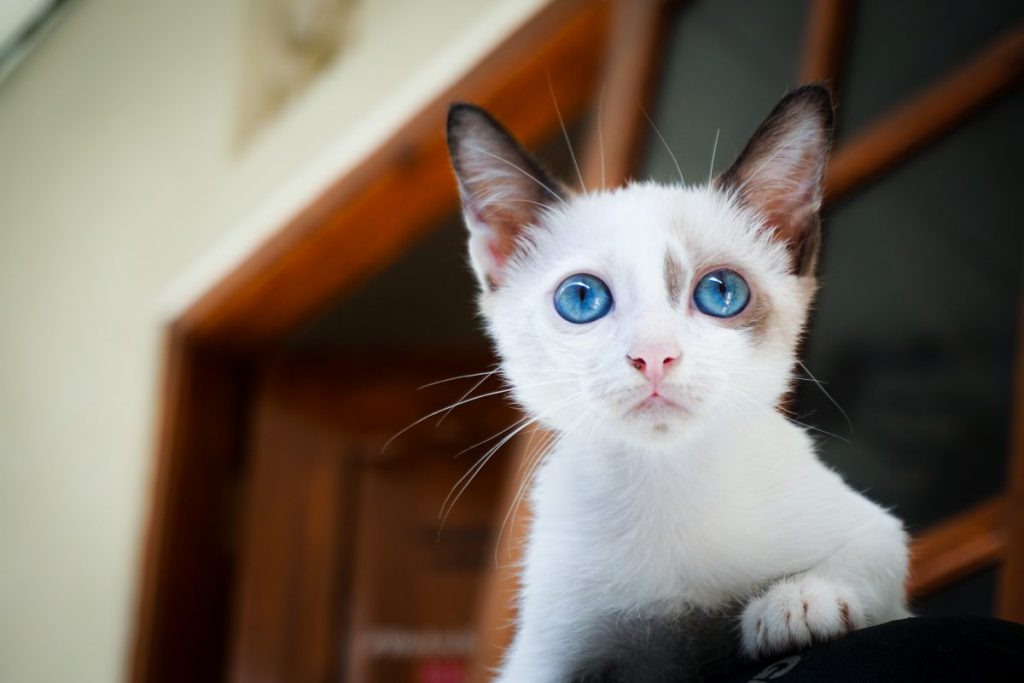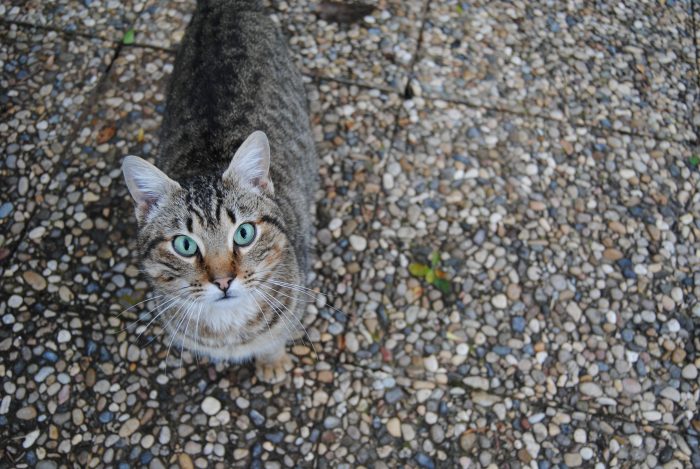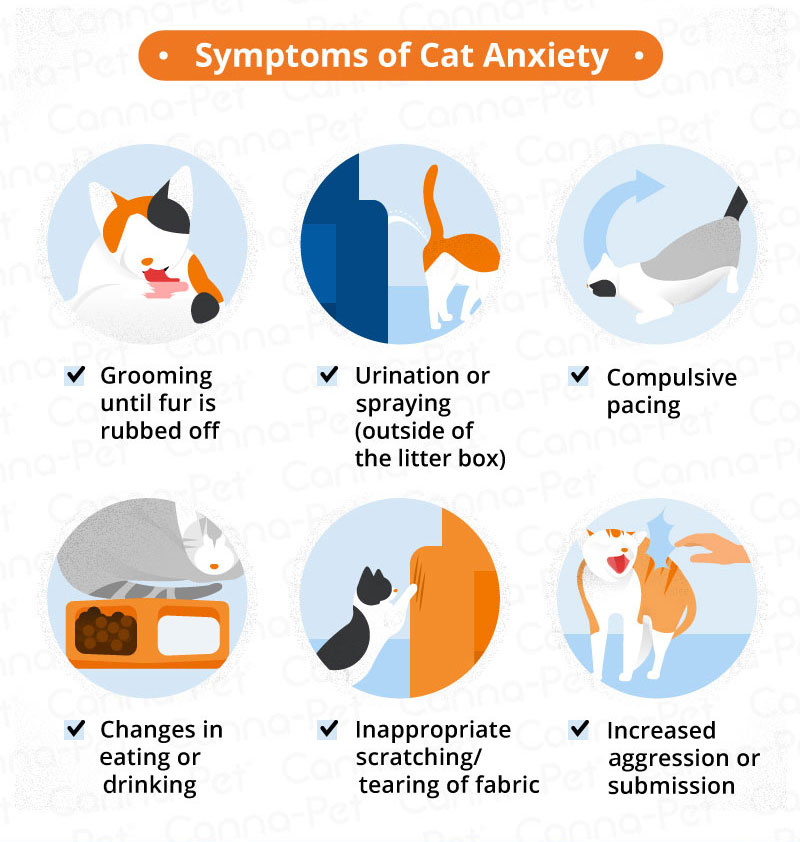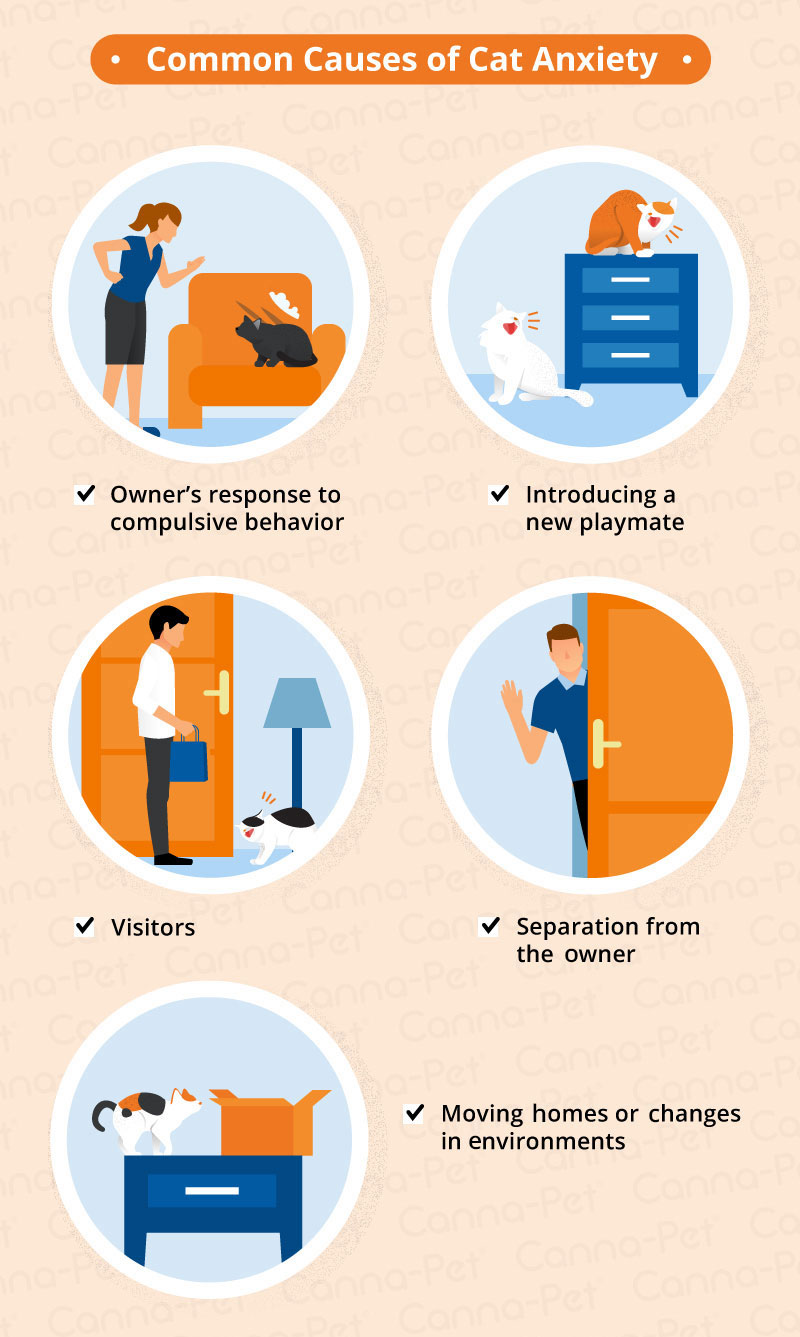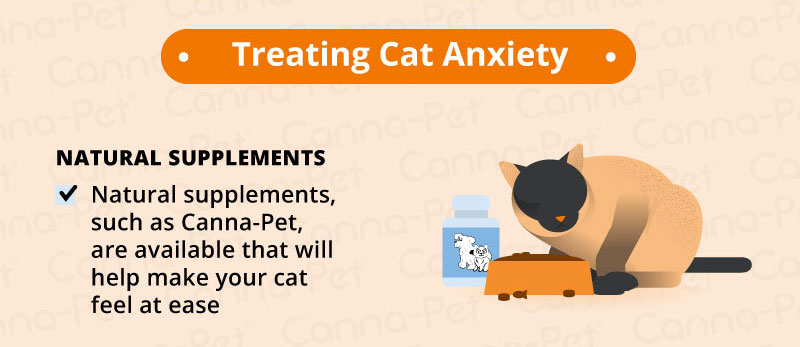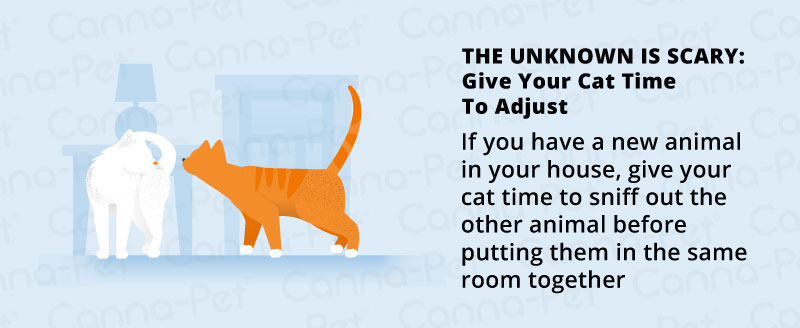There’s a reason why cats continue to be one of the most beloved types of pets: they’re intelligent, friendly, and smart. And just like humans, they have their own personalities and quirks.
Some of these quirks include fears and anxious behavior, which can manifest themselves in a variety of different ways. It’s important to understand common anxieties in cats, what causes them, and how to treat them, if necessary.
Cat Anxiety Versus Fears & Phobias
According to petMD, cat anxiety is defined as “the anticipation of future dangers from unknown or imagined origins that result in normal body reactions…associated with fear.” These anxieties are different than fear, which is an instinctual, normal behavior, and phobias, which are excessive fears of a specific situation.
For example, many cats are scared of loud noises, such as fireworks or the vacuum. They view this situation as a “fight or flight” scenario, which is their innate survival mechanism. They may hide under the bed if they feel like they are threatened, or hiss at an intruder if they think they need to fight.
In contrast, cat phobias are habitual fears of a specific situation or object. Some cat experts argue that once a phobia is realized, anything associated with that phobia will result in a similar response. An example of this would be an abused cat who fears loud voices. Every time they hear a loud voice, they remember their past phobia and automatically register the same behavior. These phobias are not always rational, but illicit a response in a fearful kitty.
Lastly, anxiety is often manifested in long-term behavior or behavior in advance of a situation. The most common form of anxiety that cats experience is separation anxiety, which is when cats become stressed and act up if their owners are gone for extended periods of time.
Feline Anxiety Symptoms
As a pet owner, you are probably in tune with your cat’s regular behavior, and know when something is amiss. But oftentimes, cat anxiety presents itself in different ways that might not be immediately noticed. Because of that, it is important to know how your cat responds to stress, when they are feeling anxious, and what is causing this anxiety. Some of the most common symptoms of cat anxiety include:
Urination or Spraying
This may be one of the most common symptoms of cat anxiety because urination is a natural way for cats, and other animals, to mark their territory. If your kitty is usually good at using the litter box and rarely has accidents, but starts urinating in other areas of the house, something may be making them anxious. Talk to your vet immediately if you start to notice this behavior. Cats may also defecate in other areas of the house other than the litter box if they are anxious. Talk to your vet about any of these changes in normal bathroom behavior.
Changes in Eating or Drinking
For the most part, cats are creatures of habit. They enjoy being fed at similar times every day, usually eat about the same amount every day, and thrive off of healthy routine. If a cat drastically changes their eating or drinking behavior, they may be anxious about something in their environment. This can include both eating less and eating more, and should be addressed with a vet.
Inappropriate Scratching
Scratching is a very normal cat behavior. Scratching allows cats to keep their claws shorter, mark their territory, show their happiness or dominance, and stretch. That is why it is highly recommended to have a designated scratching area, such as a scratching post or cat tree, for your cat. But when a cat is anxious, they may start to scratch more or scratch things they aren’t supposed to, such as a couch or rug. This is a stress-relieving behavior and may be a sign that the cat is anxious about something in their environment.
Increased Aggression or Submission
Any cat owner will testify that sometimes their furry friend can act a little odd. Because of their predator-prey roots, cats will oscillate between acting aggressive and acting submissive, especially if they have a playmate. While this behavior is normal, any major changes could be a sign of cat anxiety. For example, if a normally playful cat spends all day under the bed, they may be anxious about something.
These are just a few signs that your kitty might be experiencing some anxiety. If you notice any major changes in your cat’s behavior, eating, or litter box habits, speak with your vet about possible feline anxiety.
Now that you understand some of the common symptoms of cat anxiety, it’s important to understand what may be causing them.
Causes of Cat Anxiety
Like previously mentioned, cats are creatures of habit. If there is a change to their normal routine, they will likely be curious and may act differently. While changes in their behavior are normal, anxiety is not and must be monitored. Some things that may cause feline anxiety are:
- Introducing a new playmate – Although cats usually appreciate the company, they are, at heart, solitary animals. Most cats will be completely fine lounging the day away in the sun alone. But if you are considering adding another pet to the family, you should know how this will affect your current resident. If the new pet is not introduced correctly, your cat may become anxious over this major change.
- Visitors – Whether it’s a weekend girls trip, a couch-surfing cousin, or an extended mother-in-law’s stay, visitors can make any kitty anxious. Even if your cat usually does well under pressure, any new person in their environment may cause unrest. If you are planning to have visitors, make sure your cat has enough space to themselves if they should become scared or anxious.
- Separation from the Owner – Separation anxiety in cats is relatively common, especially from cats that have been in a shelter or experienced abandonment earlier in their lives. Separation anxiety will vary, but can be the result of both long and short trips.
- Moving Homes or Changes in Environments – Moving can be stressful for anyone, including cats! The idea of packing up their whole environment and living somewhere completely different can cause anxiety in even the calmest of kitties. In addition to moving, major changes in environment, such as moving furniture or remodeling, can cause feline anxiety, as well.
- Past Experiences – The sad reality is that many cats, especially ones adopted from a shelter or found as strays, have faced hard times and dramatic experiences. Sometimes, these traumas show through in everyday things that wouldn’t normally be cause for concern. If you notice that your cat reacts poorly to normally innocuous things, they may be exhibiting anxiety from a past experience.
These are just a few of the reasons why a cat may be feeling anxious, and the causes of feline anxiety will depend on the cat and their typical behavior. If you sense that something is off with your furry friend, visit your vet.
How to Treat Cat Anxiety
Some pet owners may be tempted to discipline an anxious cat, either out of confusion or anger, but this is the wrong way to approach feline anxiety. Anxious cats are acting out of fear, not mischief, and need to be handled in an appropriate and caring way. There is no magic way to “treat” feline anxiety, but with patience and persistence you can make your cat feel more comfortable and less anxious.
If your cat’s anxiety seems mild, and they are otherwise healthy, there may be some in-home options to try before consulting with a vet (always check with your vet, though, before trying anything at home). Some include:
- Natural Supplements – Natural supplements, such as Canna-Pet, are available that will help make your cat feel at ease. These can be used occasionally, such as for trips to the groomer and vet, and are safe for cats.
- Toys and playing – Just like children, some cats form an attachment to a comfort toy, and this toy can be used in times of stress. Also, by playing with your cats regularly, you will be helping them get the exercise they need and release some of their stress. Plus, they might just take a cat nap instead of staying awake anxiously!
The above suggestions might work for a cat with mild anxiety, but for more extreme cases, you may need to see the vet for professional help. Veterinarians and animal behaviorists have an intimate understanding of animal behavior and will be able to shed some light on a confusing situation. They may diagnose the type of behavior and help you come up with a treatment plan with positive reinforcement and helpful supplements.
Tips and Tricks for Happy Cats
If your cat regularly gets stressed or anxious, there are some tips and tricks you can do to make sure your kitty is as happy and calm as possible. Some vet favorites are:
- Always provide a safe space for your cat. Cats usually like to rest in high places, such as on a cat tower or window perch, because they feel like they are out of danger. If possible, provide multiple levels for your cat, as well as an enclosed bed or box that they can find solace in.
- If introducing a new animal into the house, do so slowly and patiently. One of the worst things you can do to your resident cat is introduce a new intruder right away and let them work it out on their own. This approach will lead to increased stress for both the resident cat and the newcomer. Instead, section off the new friend in their own room and let them adjust, while your older cat smells and investigates the new animal. Cats learn with their senses, so by limiting their interactions, your cat will be able to learn about this new playmate slowly and more confidently.
- Set a routine and stick with it. Usually cats like their food and litter to be in the same spot and to be fed at similar times every day. This regularity will also help their digestive systems.
- Keep the litter box clean. A dirty litter box can lead to many problems, such as urinating or defecating in the house or UTIs and other internal issues. Also, make sure you always have enough litter boxes around. Some vets suggest having one litter box per cat and putting them on different floors of the house if applicable.
While some stress for cats is unavoidable, it’s important to understand the signs and symptoms of anxiety and what you can do to help. Just like humans, all cats will have different stressors and will exhibit their anxiety in different ways, but we covered some of the most common anxious behaviors, causes of anxiety, and what you can do to calm your furry friend. As always, if you suspect that something is wrong with your cat, visit your vet immediately and seek professional help.
Sources:
- Neal, Brandi. “10 Signs Your Cat Has Anxiety & What You Can Do About It.” Bustle, 24 Aug. 2018, Accessed 2 Nov. 2016. www.bustle.com/p/10-signs-your-cat-has-anxiety-what-you-can-do-about-it-8871966.
- “Extreme Fear and Anxiety in Cats.” PetMD, Accessed 2 Nov. 2016. www.petmd.com/cat/conditions/behavioral/c_ct_fear_phobia_anxiety.
- “How to Reduce Anxiety Levels in Your Cat.” The Spruce Pets, Accessed 2 Nov. 2016. www.thesprucepets.com/reducing-anxiety-in-cats-554064
- “3 Ways to Calm Your Anxious Cat.” Chewy, 15 Feb. 2018, Accessed 2 Nov. 2016. www.chewy.com/petcentral/3-ways-to-calm-your-anxious-cat/.
- “Extreme Fear and Anxiety in Cats – Symptoms, Causes, Diagnosis, Treatment, Recovery, Management, Cost.” WagWalking, 5 Sept. 2016, Accessed 2 Nov. 2016. www.wagwalking.com/cat/condition/extreme-fear-anxiety.

